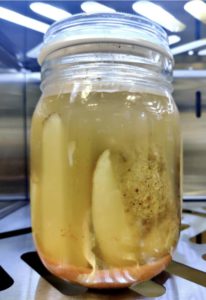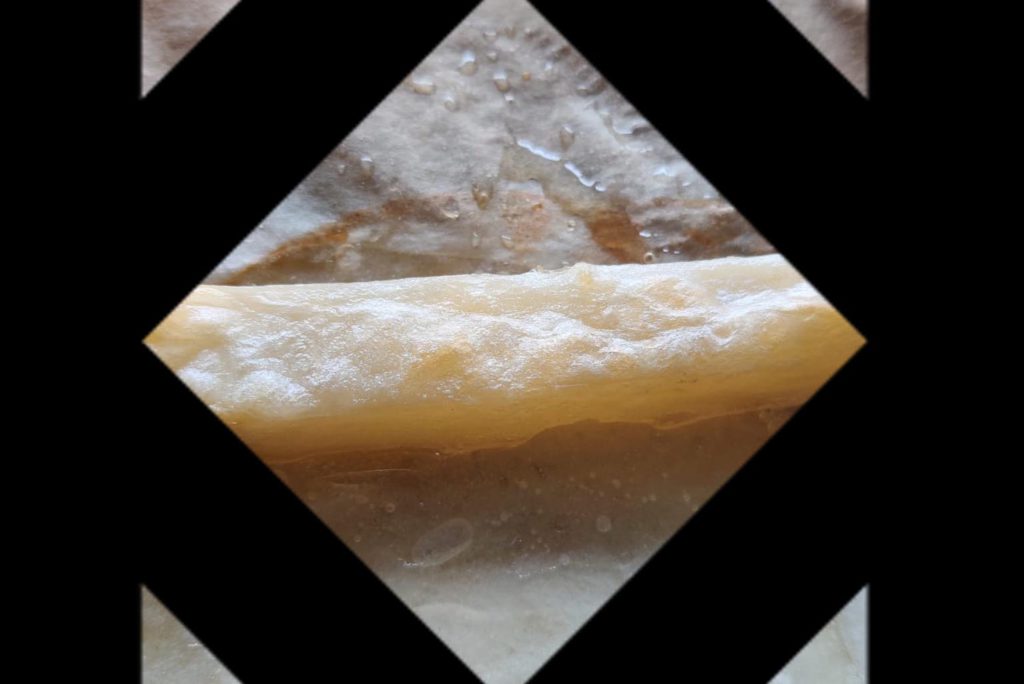We first tried fermenting potatoes a few years ago and were blown away with the complexity of the flavour and how wonderfully bubbly, crispy and salty the fermented fries turned out. The fries taste a bit like British salt and vinegar chips, and the longer you ferment them the funkier they get. We like them after 3 days fermented at 28°C.
As a bonus they cook a bit faster than making fries from raw potatoes and you can infuse them with different flavours.
Even though fermented fries are initially packed with probiotics, they will diminish during the high-heat cooking process. However, the fermentation process breaks down the potatoes and lowers the starch levels, making them easier for your gut to digest. Thus, health benefits are still achieved.
Ingredients
- Potatoes – both firm and floury potatoes work well
- Water
- Salt (1 – 1.5% brine)
Lacto-ferment the potatoes
- Wash and scrub away any dirt from the potatoes, but don’t peel them.
- Cut the potatoes into strips
- Place your fermentation container on a digital scale and tare/zero it
- Fill the container with potatoes and cover with water.
- Add 1 – 1.5 % salt (brine calculator)
- Potatoes will naturally sink to the bottom, but if you find any floating potatoes add a fermentation weight to keep the potatoes submerged under the water.
- You can fine tune the fermentation temperature to your liking. We did our potatoes at 28°C for 3 days. Adjust the temperature and time to get the right amount of acidity and flavour.

How to cook the fermented french fries
You can cook fermented french fries just the same way as you would regular fries. Just keep in mind that they are already seasoned so don’t add salt until after you have tasted the cooked fries.
Deep fry the fermented fries
Remove the fries from the brine and pat them dry. Drop them into a pan of hot cooking oil and fry until golden brown. The exact time will depend on the thickness of your potatoes and how long you fermented them.
Air fry the fermented fries
Remove the fries from the brine and pat them dry. Place in an air fryer and add cooking oil or olive oil if you want, it’s not strictly necessary but will result in slightly more crispy fries. Cook on high for about 10 minutes.
Bake the fermented french fries
Remove the fries from the brine and dry them off, add some cooking oil and place in a preheated oven 200°C (400°F) and bake for about 20 minutes. Halfway through take the tray out and toss the fries for an even more crisp chip.
Adding flavours to the fries
Experiment with adding garlic, chillies, herbs and spices when fermenting. Certain aromatics will transfer well into the potatoes while others, we tried garam masala did not really affect the final taste of the fries.
Save the brine
When you lacto-ferment the resulting brine will also be full of flavours and starches that the potatoes have released. Try using this for soups or to thicken sauces instead of using potato or corn starch.
Freeze the fermented french fries
Frozen fermented fries are great and it’s a convenient way of storing them for future use. Take the fries out of the brine, dry them, and vacuum pack, or place them in a freezer bag and try to remove as much air as possible before putting in the freezer.
If the fries are too salty
If you find the fries turn out too salty, you can put the fermented but uncooked fries into fresh water for a few hours to reduce the saltiness. If you do this you should not continue fermenting them as the salt levels may be too low to safely ferment.
Experiment with different sizes or methods
Lacto-fermenting potatoes works in almost any size, so experiment with cutting them into wedges or other shapes.
We recently have also tried fermenting the fries with whey (the watery substance that floats to the top when fermenting yoghurt), and this is probably one of our new favourite ways of preparing fermented french fries, with a short ferment of 1-2 days at 28C.
Next on our list is to ferment a whole potato for the ultimate baked potato and to mash some up for a fermented mashed potato packed with a dollop of cultured butter.

